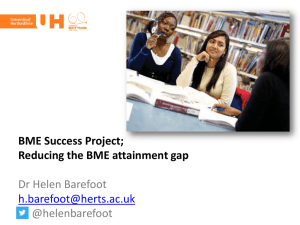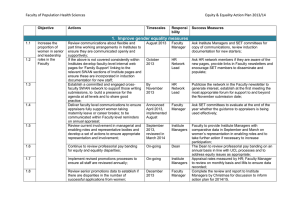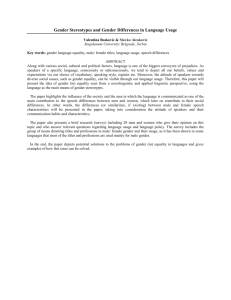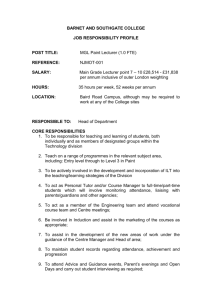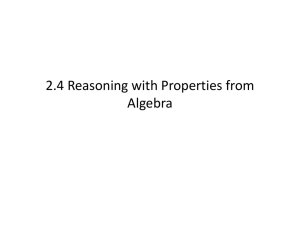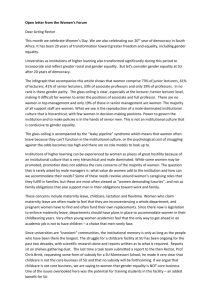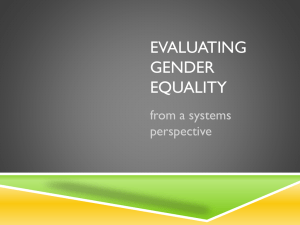*Race*, Racism and Higher Education Leadership: How can we
advertisement
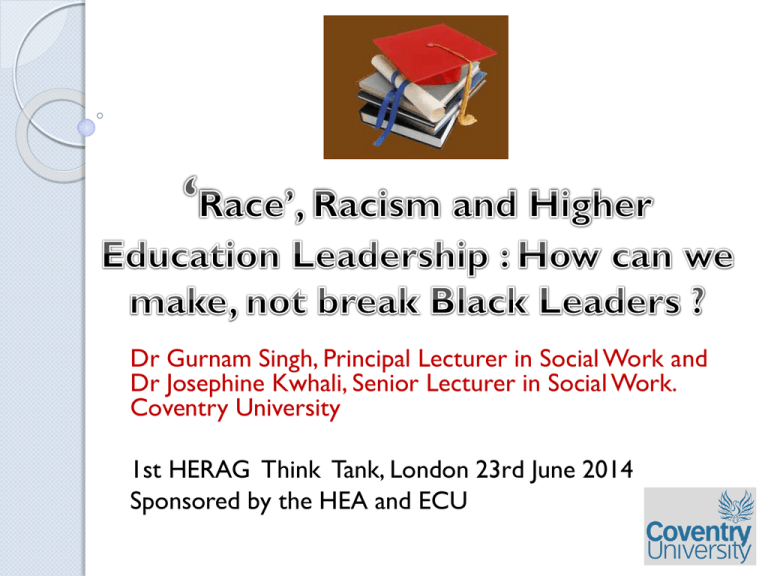
Dr Gurnam Singh, Principal Lecturer in Social Work and Dr Josephine Kwhali, Senior Lecturer in Social Work. Coventry University 1st HERAG Think Tank, London 23rd June 2014 Sponsored by the HEA and ECU Introduction: Is there a ‘ Black Experience’ of Higher Education ? Research Evidence For many universities, BME’s generally but Black people in particular are typecast as heroes (special) or villains (outsiders/interlopers) Those who break through the ‘glass roof’ face the prospect of falling back down i.e. face hostility and resentment. Others simply settle for something less fearful of being shot down. Universities are changing, but only significantly at the ‘bottom’ Colonial relations, white power and white privilege are reproduced. Nepotism, despite equality and diversity law’s and policies is rampant, particularly in relation to senior appointments. RAE, REF, NTF and the political economy of research funding contributing to the problem, as they reinforce existing power relations. James Weldon Johnson (1871-1938) Lift Every Voice and Sing, stanza 2 (1900) A continued focus on BME recruitment as a ‘ equality numbers game’ potentially entrenches racism and sexism and dislocates black intellectual leadership from the struggle for positive racial change . It may benefit the individual and the HE institution but of itself does little for black and womanist advancement and a racialised intellectual discourse Cornel West (Race Matters 1994) locates ‘ Black Leadership’ with a the need for a clear and credible sense of political struggle without which the perpetuation of white norms, knowledge and world views dominate Mohatny (1991) suggests that black academics simply become part of the colonisation process as their work has to accord with white academic tradition Erskine ( 2008) speaks of the challenge of black people finding space within the academy to ‘ think black’ . Remove the focus from the pursuit of a job, promotion, status Increase the focus on the pursuit of racial and gender integrity and black intellectual engagement What curtails or limits black academic advancement ? Dialogue ( Gurnam and Josephine – five minutes ) - as I finish you then come in Gurnam , asking a question arising from what I’ve said (especially the last couple of points I’ll conclude with ). We dialogue for 3-4 minutes with question/ responses around the issues of black discourse, the pressure to conform, the dislocation in recent years between the personal and the political, taking us in to a final point about the nature of HE responses – which then leads on to your final power point slide. In what ways do existing managerial approaches in HE respond to equality and diversity policy requirements – what needs to change ? 1. 2. 3. 4. 5. 6. 7. 8. 9. 10. Current approaches are defensive, reactive, project based and low priority, Establish ‘quota systems’ or certainly affirmative action policies? Ensure existing and new pathways into leadership roles are equitable e.g. University and National accolades such as NTF Delivering on equality should be a key element of performance review and reward for senior managers in HE Develop generous scholarship schemes for young black students Develop mentoring programme for black academics that are linked to management development programmes. Disassociate blackness with low quality and under achievement – in our minds, instructional culture and organisation structures. League tables on equality indicators including BME leadership roles. Introduce financial penalties for institutions that fail to meet equality targets. Take a lead from the US - Introduce Black Studies programmes What do we as Black people need to reclaim ? If we accept and acquiesce in the face of discrimination, we accept the responsibility ourselves and allow those responsible to salve their conscience by believing that they have our acceptance and concurrence.We should, therefore, protest openly about everything that smacks of discrimination or slander. Mary McLeod Bethune (1875-1955) "Certain Unalienable Rights," What the Negro Wants, edited by Rayford W. Logan (1944) Open Discussion 15 minutes Structure will depend on size of the group and space etc.
